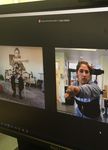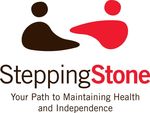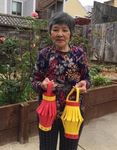If we can't bring clients to the Centers, than we have to bring the Center to the clients
←
→
Page content transcription
If your browser does not render page correctly, please read the page content below
“If we can’t bring clients to
the Centers, than we have
to bring the Center to the
clients”
“Staying socially active and connected to their community is another way to keep
our participants healthy, happy, and safe. The importance is immeasurable. In my
opinion it is just as vital as their daily basic needs.” Sandia Bruno, Presentation
Center Activities Coordinator.
One of the great strengths of traditional adult day health care (ADHC) is that in
providing care in a group setting participants are able to make friends, socialize
and remain connected to their communities. This is important for frail elders and
people with disabilities, who are risk of isolation.
This is why SteppingStone, when providing care at our Centers, always had robust
group activities including group therapies, discussion groups, entertainment and
field trips. In addition, all Centers celebrated holidays with decorations, special
events and special meals. Each Center was a community in itself, for many
participants their primary social outlet and a place where they had many friends.
Therefore, when in-Center activities were suspended and all clients instructed to
shelter in their homes last March, there was great apprehension. The risk to
SteppingStone’s hundreds of participants was not just the disruption of health
care, but also loss of their support group and contact with their friends and
community. The challenge to the agency was to help clients remain socially
engaged using only safe, physically distant services; to continue the community
that existed at each Center, even though none of participants could attend in
person.
In January 2021, ten months after the shutdown, the
activities undertaken by each Center to keep their clientsengaged are many and provided in an array of methods:
by phone, ZOOM, Skype, doorstep visits and mailings.
Engagement is both one-on-one and through therapeutic
and recreational groups. The goal is to offer multiple
opportunities for personal contact so clients are not
isolated, even though they are sheltering in their homes.
All clients continue to receive wellness calls multiple times
each week from a range of clinicians to monitor health
concerns. In addition:
SteppingStone is offering dozens of therapy classes and
recreational activities every week via both ZOOM and
Skype. Participation rates vary by Center, but currently
range between 10% and 30% on any given week.
SteppingStone is working to help participants get online so they can
participate in ZOOM activities by providing training and equipment, including
tablets and wireless connections as needed. As a result, more clients join
online programs every month.
Every participant receives in-person doorstep visits that includes personal
contact with SteppingStone staff at least monthly and for many every week.
This is often in conjunction with deliveries of food and other supplies and
includes health assessments.
Every participant receives a weekly recreational packet by delivery or mail.
These are tailored to the interests of each participant and is in their primary
language.
All Centers have their own newsletters that keep participants informed about
activities and special events within the group including birthdays and
holidays.
When the Centers were open, the Activity Coordinators led social and recreational
activities and they continue to lead these activities using remote services. These
vary among Centers, and are personalized for every participant based on interest,
language preference and health.
At Mission Creek Center:
“About a quarter of our clients participate in ZOOM
activities, of which the most popular is ZOOM Bingo. It
is difficult for me to run that group, because everyone
is so happy to see each other. Some clients get
depressed and do not want to join group activities. In
that case, I just listen to them and provide support.
This can be on a phone call, a ZOOM conversation or
during one of my doorstep visits.”
“Because a number of our participants’ primary
language is Spanish, I am their principle contact. I lead
therapy instruction in Spanish and create recreation material for our Spanish
speaking clients.” Maria Martinez, Mission Creek Center, Activities Coordinator
At Mabini Center:
“One of our more successful attempts at keeping participants connected and
engaged with the Mabini community is through a monthly arts & crafts project.
“We send the materials and instructions out to most participants in both Englishand Chinese. We encourage them to not only engage in the project, but also to send us a photograph which we share with all participants in our weekly newsletter mailing for the express purpose of creating a sense of community among everyone. Over time we've learned to also reach out to family and caregivers to encourage their support in helping participants complete the project.” Melissa MacDonald, Mabini Center, Program Director At Golden Gate Center: “Our Golden Gate Center provides different kinds of individualized therapeutic activities (i.e. word puzzle, adult coloring pages, DIY picture puzzles, exercises and educational courses by zoom) to satisfy our participants’ needs and interests. “According to each participant’s culture and language, we provide the appropriate activities. For example, we design some Chinese matching games for some Chinese participants who do not know much English; and we make coloring matching games for participants with dementia. We provide weekly grocery for participants who need the grocery. Also, we provide a monthly newsletter for the participants to know about our updated information and activities.” Roy Yang, Golden Gate Center Activities Coordinator At Presentation Center “In August I created the Presentation Newsletter, because I wanted the participants to know if we could not bring them to the center, we were going to bring the center to them. Our newsletter includes all the special things we do here: birthday celebrations, cultural holidays, acknowledgement of new members, and memorials for those who we have lost. August's focused on Korean Independence Day; September's focused on the Mid-Autumn Moon Festival; October had National China Day and Halloween; November was Thanksgiving & Diwali, and December had Hanukkah, Christmas, and Kwanzaa.” “We are mostly in contact via telehealth. We also have zoom classes four times a week where participants can continue with their Body Dynamics, TheraBand, and Tai Chi exercises as well as our Stress Busters class. I host a weekly Skype call where participants are able to speak with their friends from the Center over the phone. We have also used Skype for health education classes with our nurse. “We have continued to collaborate with the high school students who used to come to our centers to engage with our participants through our activity program. They are now writing our participants personalized letters, making them masks and recreational materials that I include in their weekly activity mailings and doorstep deliveries. ” Sandia Bruno, Presentation Center Activities Coordinator.
The statements above describe activities underway in
January 2021 to help SteppingStone participants stay
engaged and connected to their communities. In the
coming months we expect many more clients to join
online activities and other programs as the agency strives
to keep them healthy, socially engaged and connected to
their communities.
Photos: (Masthead) Left: Presentation Center participants during doorstep visit and delivery which
includes a Korean language newspaper. Right: Presentation Center Activity Coordinator Sandia Bruno.
(Top) Golden Gate Center Activity Coordinator Roy Yang with holiday present for participant to be
delivered.
(Middle 1) Mission Creek Activity Coordinator Maria Martinez doing a one-on-one exercise class with
participant on ZOOM.
(Middle 2) Mabini Center participant with Moon Festival lanterns, one of the Center’s craft projects.
(Bottom) Golden Gate Center Activity Coordinator Roy Yang created New Year’s artwork for participants.
Each means "longevity", "peace", "safe is luck", "enjoy life" from left to right .
Donate Contact Us
www.steppingstonehealth.org
SteppingStone Health | 930 Fourth St | San Francisco, CA | 415-974-6784You can also read
























































